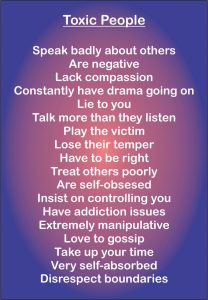It seems like the word toxic is everywhere. Toxic work places, lots of toxic health and environmental issues, toxic waste, ugh! As a matter of fact, “toxic” was The Oxford English Dictionary word of the year in 2018. I have even received several requests to write an article about toxic people.

What is a Toxic Person?
People that come up to you to talk, and when they leave you feel worse than you did before they arrived, might be toxic. People that are always complaining, but nothing is their fault and yet they can make you feel guilty about their problem. Someone whose negative behavior causes distress, or who does things that leave you frustrated, anxious, or stressed is likely toxic.
It would be so easy if toxic people came with a warning label, because sometimes they are hard to spot. But I’m willing to bet you all know or are related to a toxic person. “Often the phrase “toxic person” is used to describe someone who is subtly or outwardly manipulative, self-centered, needy, or controlling.” – psychcentral.com
How do you know if someone is toxic? How can you cope? You have to be present and aware, and you have to be willing to accept the truth. In the end, it will be up to you to change your behavior. Remember, we can’t control the actions of others, but we can control our reaction to them.
Toxic People Warning Signs
Here are some warning signs to watch for if you think you’re dealing with a toxic person. The warning signs involve recognizing how a toxic person makes you feel as well as what they say and do:
- You feel manipulated and your boundaries aren’t respected.
- You always have to defend yourself. Or, you deserve an apology that never comes.
- You never feel fully comfortable around them and you feel bad about yourself in their presence.
- When you leave conversations or meetings with them, you are drained or angry.
- You feel guilt for saying “no” and they won’t take “no” for an answer.
- Drama follows them everywhere. And, anxiety and stress tag along.
- They judge others, including you.
- Their neediness is stifling, but if you need them, they are nowhere to be found.
I must say in all candor that some people with toxic behavior aren’t really aware of it. If that is the case talk with them and tell them how it’s making you feel. You may want to take my Toxicity Quiz. It can let you know if you are a toxic person. But, more important, you can easily pretend to be a person who you suspect is toxic and take the quiz on their behalf to determine if they really are a toxic person.

“As you remove toxic people from your life you free up space and emotional energy for positive healthy relationships” – Therandomvibez
So if you’re dealing with toxic behaviors, what can you do to lessen or eliminate the damage to your well-being?
Toxic Mitigation
Limit your time around them
If you find yourself in a toxic relationship, the best advice is to move on or limit your interaction. Stay cool, calm and courteous but always in control.
Set and maintain boundaries
Knowing where to draw boundaries and keeping those boundaries is crucial, especially in the face of manipulation. You must establish limits for what you are willing to do. No more no less.
Don’t buy a ticket to the drama
It’s human nature to feel drawn to other’s troubles, but when toxic behavior is involved you can easily find yourself out of the audience and onto the stage. Now you are a part of their problem/production. Keep your distance and only talk with them about their troubles if knowing aids your endeavors.
Control the chaos
If you are just becoming aware of someone’s toxic behavior, you might feel like there is nothing you can do. There is! Once you have identified a person with toxic behavior you will begin to understand it and be able to predict what’s next. Now you are in control and you can decide when and where you have to put up with them.
Stay off the fix-it Ferris wheel
Resist the urge to give advice that you think might help. Remember toxic people like the attention. Trying to help can be a frustrating circle of advising, listening, excuses, advising, denying, and no solution. Try to remain neutral and as uncommitted as possible.
Don’t play the blame game
First and foremost, you are not to blame. The person pointing their finger should be looking in a mirror. The anger, anxiety, stress and frustration you might be feeling are not yours. They belong to the person who is projecting them on to you. Just like a duck shaking the water off his back, stand tall shake it off and walk away. You are not at fault. The toxic person will do anything to win you over so they can take you over. It’s not your circus, let them drive their own clown car.
We all know toxic people are difficult, but it’s worse than that. A toxic person can control you, smother you, and drain the energy out of you by just being around you.
Their narcissistic controlling behavior often leads to verbal or physical abuse. If you let them, they can cause so much stress you could question your sanity. This all can lead to lowered self-esteem, and anxiety and depression. So it’s more than they are “difficult.” They can be dangerous.
The tips above can help, but, as always, if you find yourself in a situation that is out of control, reach out for help from a mental health professional. Then, you can maintain healthy and supportive relationships for yourself and the people in your life.
